Lidl has beaten Aldi to the title of cheapest supermarket of the month, knocking it from the top spot which it held for nearly two years.
Consumer group Which? said that Lidl was the cheapest supermarket for a shopping list of 76 items.
The list of 76 items included both branded and own-brand items, such as Birds Eye Peas, Hovis bread, milk and butter.
The analysis includes special offer prices and loyalty prices where applicable, but not multibuys.
However, it has now been usurped by its German rival Lidl, where the shopping bill came to £128.40 on average across the month.
Members of the Lidl Plus loyalty scheme could also save a further 40p on the price of the groceries.
The price of the same shop at Aldi was 85p more expensive than its fellow discount supermarket.
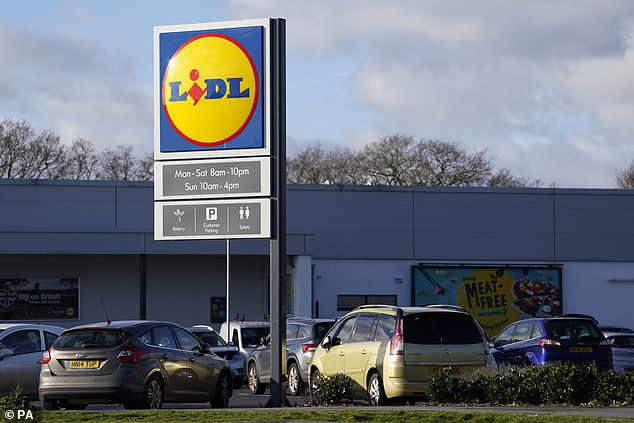
Lidl has beaten Aldi to the title of cheapest supermarket of the month, knocking it from the top spot which it held for nearly two years
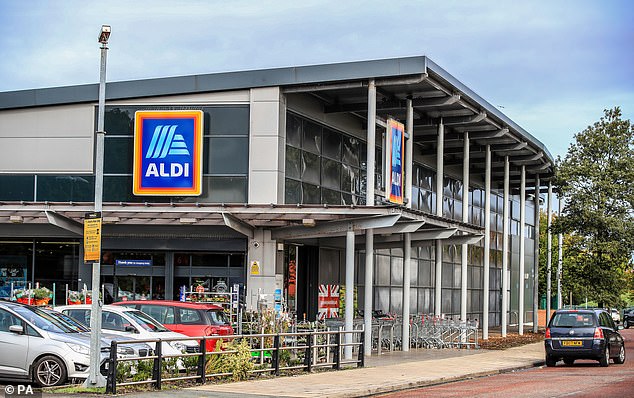
Aldi was beaten by Lidl for the first time in 20 months, with the price of the shop coming in 85p more expensive in July
The longer list at Asda cost £474.12, cheaper than Tesco with a Clubcard by £7.47 (£481.59).
| Supermarket | Average price |
|---|---|
| Lidl (inc loyalty discount) | £128 |
| Lidl | £128.40 |
| Aldi | £129.25 |
| Asda | £139.53 |
| Tesco (inc loyalty discount) | £141.92 |
| Sainsbury’s (inc loyalty discount) | £144.21 |
| Tesco | £145.10 |
| Morrisons (inc loyalty discount) | £146.91 |
| Morrisons | £147.84 |
| Sainsbury’s | £149.55 |
| Ocado | £159.20 |
| Waitrose | £170.91 |
In a longer list of 192 items, Asda remained cheaper than Tesco – even with a Clubcard.
The study of bigger shops does not include Aldi or Lidl because they do not always stock some of the products on the consumer group’s larger shopping list.
Waitrose was the most expensive on average, with the bigger shop costing £538.33 – a difference of £64.21 compared to Asda – 14 per cent more.
Waitrose was also the most expensive supermarket for a smaller list of items this month, totalling £170.91 on average.
Which means shoppers would be spending £42.51 more on the same shop at Watrose than shopping at Lidl with a loyalty card, a 34 per cent increase.
For the smaller shop, Tesco Clubcard members would have paid £141.92 on average which is £13.92 more than at Lidl with a loyalty card.
However for shoppers without a Clubcard, the Tesco shop cost £145.10.
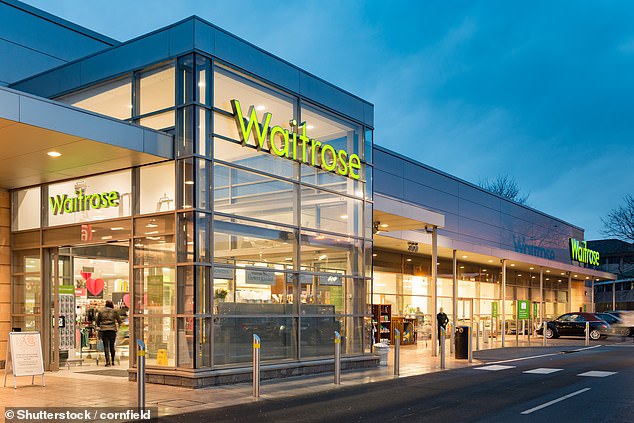
Waitrose was also the most expensive supermarket for a smaller list of items this month, totalling £170.91 on average
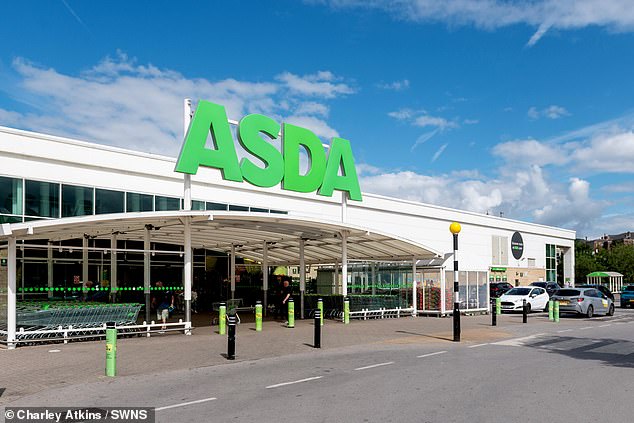
In a longer list of 192 items, Asda remained cheaper than Tesco – even with a Clubcard
| Supermarket | Average price |
|---|---|
| Asda | £474.12 |
| Tesco (inc loyalty discount) | £481.59 |
| Sainsbury’s (inc loyalty discount) | £490.64 |
| Morrisons (inc loyalty discount) | £491.87 |
| Morrisons | £502.24 |
| Tesco | £513.79 |
| Ocado | £521.72 |
| Sainsbury’s | £525.98 |
| Waitrose | £538.33 |
For those using a Sainsbury’s Nectar card, July’s shopping list of items averaged £144.21, which is £16.21 more than at Lidl with a loyalty card.
Without a Nectar card, the same items at Sainsbury’s cost £149.55.
The main list of around 200 items remains unchanged each month and is not revealed to the supermarkets involved.
Reena Sewraz, Which? Retail Editor, said: ‘Lidl has bagged the top spot as the UK’s cheapest supermarket for the first time in 20 months, according to our latest price analysis, showing that it can beat Aldi even without loyalty prices.
‘The bigger trolley of groceries shows that Asda continues to be the cheapest non-discounter supermarket – beating membership prices at Tesco, Sainsbury’s and Morrisons.
‘Households are still contending with high food prices but our analysis shows it pays to shop around, simply choosing one supermarket over another could save you 25 per cent.’
Families are said to be saving money by switching to simpler meals with own-brand products and fewer ingredients as grocery price inflation soared to an 18-month high.
The prices of foods such as fresh meat, chocolate, butter and spreads are now rising the fastest, although costs are falling for dog food, sweets and laundry products.
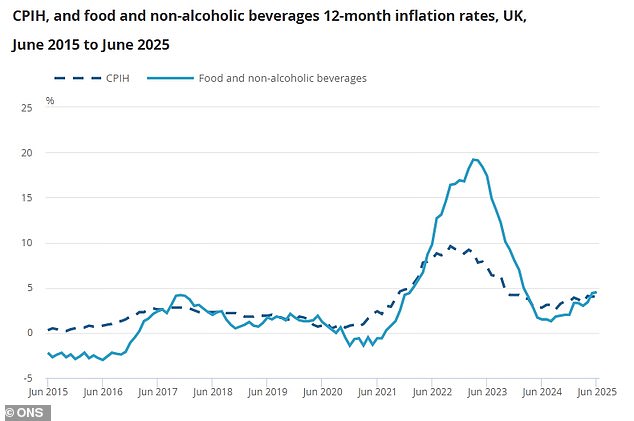
The ONS also said that annual food price inflation hit the highest level since February 2024
The inflation rate hit 5.2 per cent for the four weeks to July 13 – its highest since January 2024, according to Worldpanel by Numerator, formerly known as Kantar.
Revenues at many supermarkets in the UK are benefiting from the price surge with take-home sales at the grocers growing by 5.4 per cent in the four-week period.
Lidl had a strong month as it hit a record high market share of 8.3 per cent, gaining 0.5 percentage points as it attracted more than 500,000 new customers to stores.
Britain’s biggest supermarket Tesco also did well as it boosted its share to 28.3 per cent as sales grew by 7.1 per cent, the fastest rate since December 2023.
Sales at Sainsbury’s increased by 5.3 per cent, putting its market share at 15.1 per cent – while grocery sales at M&S were 6.5 per cent higher than a year ago.
Sales at the UK’s fourth largest grocer Aldi increased by 6.3 per cent, bringing its share to 10.9 per cent. Aldi overtook Morrisons in autumn 2022, with the latter seeing sales nudge up by just 1.0 per cent and it now holds 8.4 per cent of the market.
Ocado retained its place as the fastest growing British grocer as its sales rose by 11.7 per cent, exceeding the overall online market growth rate of 5.7 per cent.
Online accounted for 12 per cent of all sales at the grocers over the past 12 weeks, with 23 per cent of households making at least one virtual shopping trip.
But Asda saw its market share fall one percentage point from 12.8 to 11.8 per cent; while Co-op’s share dropped half a percentage point from 5.7 to 5.2 per cent.












